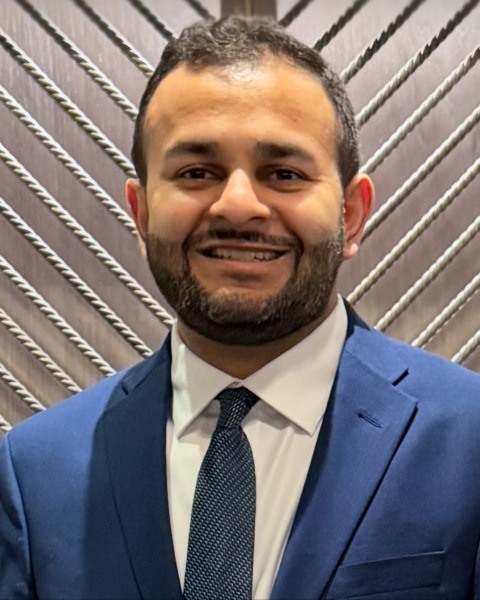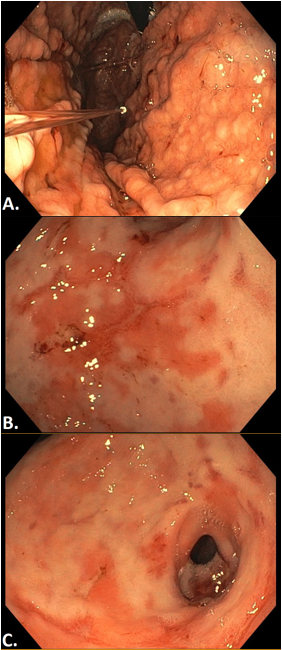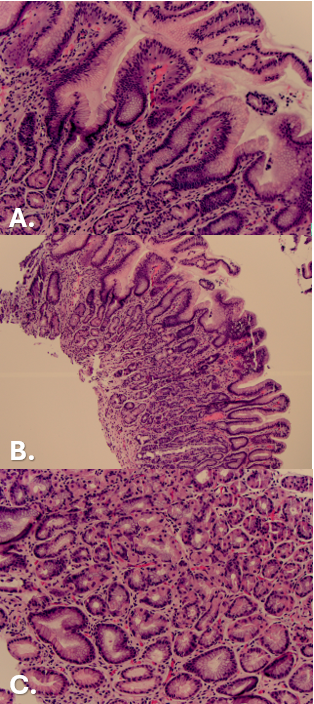Sunday Poster Session
Category: Stomach and Spleen
P2121 - Recognizing Ischemic Gastropathy via Endoscopy
Sunday, October 26, 2025
3:30 PM - 7:00 PM PDT
Location: Exhibit Hall

Sheel H. Clerk, DO, MPH
Arnot Ogden Medical Center
Elmira, NY
Presenting Author(s)
Sheel H. Clerk, DO, MPH, Jose Russe-Russe, MD, Gurtej Dhaliwal, MBBS, Rabie Shahzad, MBBS, Brendan Gregg, DO, Tenzin Tseky, DO, Prashant Jadav, DO, Daniel Casas, DO, Brian Sowka, DO, Yafei Wang, MD, Gary Valvano, DO, Bruno Mazza, MD
Arnot Ogden Medical Center, Elmira, NY
Introduction: Chronic mesenteric ischemia (CMI), defined as longstanding, inadequate gastrointestinal perfusion due to progressive narrowing of arteries of 70% or greater, is typically diagnosed and manifested clinically by postprandial abdominal pain, fear of eating, and weight loss. Risk factors for CMI are cardiometabolic in nature, however, exacerbation is enhanced by atherosclerosis, sedentary lifestyle, and extensive smoking. Furthermore, despite CT angiography being the diagnostic modality of choice, gastric ischemia is infrequent due to its rich collateral blood supply and scarcely diagnosed via endoscopy, as highlighted in the following case.
Case Description/
Methods: A 72-year-old male with 54-pack-year smoking history presented with persistent abdominal pain and weight loss underwent an endoscopy which revealed gastric ischemic changes (Fig 1) and ulcerations in the gastric antrum, with biopsies demonstrating reactive gastropathy and chronic inactive gastritis without H. pylori, dysplasia, or neoplasia (Fig 2). Afterward, he was started on PPIs and sucralfate and had a CT angiogram showing near-total occlusion of the proximal celiac trunk and superior mesenteric artery. Subsequently, the affected vessels were stented by vascular surgery and the abdominal pain resolved within weeks.
Discussion: Ischemic gastropathy due to CMI is typically a clinical diagnosis reached by assessing cardiometabolic and behavioral risk factors such as, atherosclerosis and smoking history, with the patient’s primary complaints of abdominal pain leading to weight loss due to fear of eating. Considering its extensive collateral blood supply, gastric ischemic injury is unusual, and symptoms of CMI can be masked and suspected by other etiologies. This particular case initially uncovered and recognized macroscopic ischemic changes via endoscopy and was confirmed by CT angiography.
The expanding diagnostic modalities for ischemic gastropathy stem from the significant mortality rate within six months noted in prior studies. However, when a diagnosis is missed, delayed, or underrecognized due to nonspecific presentations, mortality rises exponentially. Detection via endoscopy, followed by imaging confirmation and subsequent endovascular intervention, ultimately led to symptom resolution, highlighting the importance of careful history-taking, thorough investigation, and detailed assessment, particularly in cases with nonspecific symptoms and associated risk factors.

Figure: Fig 1. Macroscopic demonstration of irregularly shaped tan-white soft tissue changes seen within the fundus (A), body (B), and antrum (C).

Figure: Fig 2. Microscopic demonstration of benign antral and oxyntic-type gastric mucosa with features of reactive (chemical) gastropathy (A), non-specific minimal chronic inactive gastritis (B), and no evidence of acute inflammation, intestinal metaplasia or significant atypia seen (C).
Disclosures:
Sheel Clerk indicated no relevant financial relationships.
Jose Russe-Russe indicated no relevant financial relationships.
Gurtej Dhaliwal indicated no relevant financial relationships.
Rabie Shahzad indicated no relevant financial relationships.
Brendan Gregg indicated no relevant financial relationships.
Tenzin Tseky indicated no relevant financial relationships.
Prashant Jadav indicated no relevant financial relationships.
Daniel Casas indicated no relevant financial relationships.
Brian Sowka indicated no relevant financial relationships.
Yafei Wang indicated no relevant financial relationships.
Gary Valvano indicated no relevant financial relationships.
Bruno Mazza indicated no relevant financial relationships.
Sheel H. Clerk, DO, MPH, Jose Russe-Russe, MD, Gurtej Dhaliwal, MBBS, Rabie Shahzad, MBBS, Brendan Gregg, DO, Tenzin Tseky, DO, Prashant Jadav, DO, Daniel Casas, DO, Brian Sowka, DO, Yafei Wang, MD, Gary Valvano, DO, Bruno Mazza, MD. P2121 - Recognizing Ischemic Gastropathy via Endoscopy, ACG 2025 Annual Scientific Meeting Abstracts. Phoenix, AZ: American College of Gastroenterology.
Arnot Ogden Medical Center, Elmira, NY
Introduction: Chronic mesenteric ischemia (CMI), defined as longstanding, inadequate gastrointestinal perfusion due to progressive narrowing of arteries of 70% or greater, is typically diagnosed and manifested clinically by postprandial abdominal pain, fear of eating, and weight loss. Risk factors for CMI are cardiometabolic in nature, however, exacerbation is enhanced by atherosclerosis, sedentary lifestyle, and extensive smoking. Furthermore, despite CT angiography being the diagnostic modality of choice, gastric ischemia is infrequent due to its rich collateral blood supply and scarcely diagnosed via endoscopy, as highlighted in the following case.
Case Description/
Methods: A 72-year-old male with 54-pack-year smoking history presented with persistent abdominal pain and weight loss underwent an endoscopy which revealed gastric ischemic changes (Fig 1) and ulcerations in the gastric antrum, with biopsies demonstrating reactive gastropathy and chronic inactive gastritis without H. pylori, dysplasia, or neoplasia (Fig 2). Afterward, he was started on PPIs and sucralfate and had a CT angiogram showing near-total occlusion of the proximal celiac trunk and superior mesenteric artery. Subsequently, the affected vessels were stented by vascular surgery and the abdominal pain resolved within weeks.
Discussion: Ischemic gastropathy due to CMI is typically a clinical diagnosis reached by assessing cardiometabolic and behavioral risk factors such as, atherosclerosis and smoking history, with the patient’s primary complaints of abdominal pain leading to weight loss due to fear of eating. Considering its extensive collateral blood supply, gastric ischemic injury is unusual, and symptoms of CMI can be masked and suspected by other etiologies. This particular case initially uncovered and recognized macroscopic ischemic changes via endoscopy and was confirmed by CT angiography.
The expanding diagnostic modalities for ischemic gastropathy stem from the significant mortality rate within six months noted in prior studies. However, when a diagnosis is missed, delayed, or underrecognized due to nonspecific presentations, mortality rises exponentially. Detection via endoscopy, followed by imaging confirmation and subsequent endovascular intervention, ultimately led to symptom resolution, highlighting the importance of careful history-taking, thorough investigation, and detailed assessment, particularly in cases with nonspecific symptoms and associated risk factors.

Figure: Fig 1. Macroscopic demonstration of irregularly shaped tan-white soft tissue changes seen within the fundus (A), body (B), and antrum (C).

Figure: Fig 2. Microscopic demonstration of benign antral and oxyntic-type gastric mucosa with features of reactive (chemical) gastropathy (A), non-specific minimal chronic inactive gastritis (B), and no evidence of acute inflammation, intestinal metaplasia or significant atypia seen (C).
Disclosures:
Sheel Clerk indicated no relevant financial relationships.
Jose Russe-Russe indicated no relevant financial relationships.
Gurtej Dhaliwal indicated no relevant financial relationships.
Rabie Shahzad indicated no relevant financial relationships.
Brendan Gregg indicated no relevant financial relationships.
Tenzin Tseky indicated no relevant financial relationships.
Prashant Jadav indicated no relevant financial relationships.
Daniel Casas indicated no relevant financial relationships.
Brian Sowka indicated no relevant financial relationships.
Yafei Wang indicated no relevant financial relationships.
Gary Valvano indicated no relevant financial relationships.
Bruno Mazza indicated no relevant financial relationships.
Sheel H. Clerk, DO, MPH, Jose Russe-Russe, MD, Gurtej Dhaliwal, MBBS, Rabie Shahzad, MBBS, Brendan Gregg, DO, Tenzin Tseky, DO, Prashant Jadav, DO, Daniel Casas, DO, Brian Sowka, DO, Yafei Wang, MD, Gary Valvano, DO, Bruno Mazza, MD. P2121 - Recognizing Ischemic Gastropathy via Endoscopy, ACG 2025 Annual Scientific Meeting Abstracts. Phoenix, AZ: American College of Gastroenterology.
